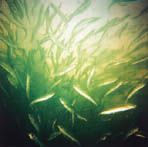
Sustainable and Environmentally Sound Fisheries
 Fish stocks and marine ecosystems of the North-East Atlantic have come under extreme pressure from overfishing, by-catch, discards and damaging fishing gear. In the North Sea, cod stocks are in danger of collapsing, almost half all the fish caught is discarded and the sea floor is frequently swept by heavy beam trawls. In the wider North-East Atlantic, key commercial species such as halibut and redfish could go down the same road as cod, herring and capelin in the past. The incidental take of marine mammals, seabirds, sharks, turtles and other non-target species is a serious problem. WWF believes that precautionary approaches and environmental objectives need to be integrated into fisheries policy and management in order to halt overfishing, ensure the recovery of depleted fish stocks and minimise the impact on wildlife. This includes establishing no-take zones for fisheries. Having initiated the Marine Stewardship Council (MSC) which aims at certification of products from sustainable fisheries WWF supports its progress.
Fish stocks and marine ecosystems of the North-East Atlantic have come under extreme pressure from overfishing, by-catch, discards and damaging fishing gear. In the North Sea, cod stocks are in danger of collapsing, almost half all the fish caught is discarded and the sea floor is frequently swept by heavy beam trawls. In the wider North-East Atlantic, key commercial species such as halibut and redfish could go down the same road as cod, herring and capelin in the past. The incidental take of marine mammals, seabirds, sharks, turtles and other non-target species is a serious problem. WWF believes that precautionary approaches and environmental objectives need to be integrated into fisheries policy and management in order to halt overfishing, ensure the recovery of depleted fish stocks and minimise the impact on wildlife. This includes establishing no-take zones for fisheries. Having initiated the Marine Stewardship Council (MSC) which aims at certification of products from sustainable fisheries WWF supports its progress.
| further objectives |